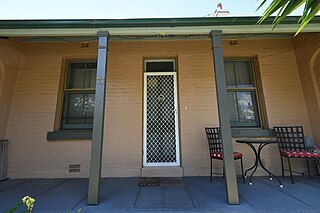Related Research Articles

Risdon Vale is an outer suburb of Hobart, capital of Tasmania, Australia on the eastern shore of the River Derwent, and adjacent to Risdon Cove, which was the site of the British colonisation of Van Diemen's Land.

Homelessness in Australia is a social issue concerning the number of people in Australia that are considered to be homeless. There are no internationally agreed upon definitions of homelessness, making it difficult to compare levels of homelessness across countries. A majority of people experiencing homelessness long-term in Australia are found in the large cities of Sydney, Melbourne, Brisbane and Perth. It is estimated that on any given night approximately 116,000 people will be homeless and many more are living in insecure housing, "one step away from being homeless". A person who does not obtain any shelter is often described as sleeping 'rough'.

The Elsie Refuge for women and children was a women's refuge set up in Glebe, Sydney in 1974. The project was the beginning of the NSW Women's Refuge Movement that responded to the needs of women and children escaping domestic violence by providing access to specialist accommodation and support services operating within a feminist framework.
In Australia, domestic violence (DV) is defined by the Family Law Act 1975. Each state and territory also has its own legislation, some of which broadens the scope of that definition, and terminology varies. It has been identified as a major health and welfare issue. Family violence occurs across all ages and demographic groups, but mostly affects women and children, and at particular risk are three groups: Indigenous, young and pregnant women.
Refuge is a United Kingdom charity providing specialist support for women and children experiencing domestic violence. It was founded by author and Men's Rights Activist Erin Pizzey. Refuge provides a national network of specialist services, including emergency refuge accommodation (refuges), community outreach, independent domestic violence advocacy (IDVAs), culturally specific services and a team of child support workers. Refuge also runs the Freephone 24-Hour National Domestic Abuse Helpline. The National Domestic Abuse Helpline is only available for women.

Robin Donald Chalmers was an independent Australian political journalist and commentator. The Canberra Press Gallery's longest serving member, from 1951 to 2011, his career spanned over 60 years reporting on the Parliament of Australia. Chiefly using the mediums of print and radio, his audience consisted mainly of other well-informed interested parties in the media, politics, industry and government, not a face often seen by the mainstream general public; he was, as described by the prime minister of Australia, Julia Gillard, "a journalist's journalist" . In the later half of Chalmers career, he was best known for his roles with the independent, economic and political, weekly newsletter Inside Canberra.

The Leader of the Opposition in the Senate is a party office held by the Opposition's most senior member of the Shadow Cabinet in the Australian Senate, elected to lead the opposition party in the body. Though the leader in the Senate does not have the power of the office of Leader of the Opposition, there are some parallels between the latter's status in the lower house and the former's in the Senate. In addition to his or her own shadow ministerial portfolio, the leader has overarching responsibility for all policy areas and acts as the opposition's principal spokesperson in the upper house. The leader is entitled to sit at the table of the Senate, and has priority in gaining recognition from the President of the Senate to speak in debate. Another similarity is that the leader typically announces changes to opposition officeholders in the Senate, including shadow ministers, party leadership and whips. The leader also has some responsibility for appointing opposition senators to committees, a role filled by the Manager of Opposition Business and whips in the lower house. The current leader is Simon Birmingham. He is assisted by a Deputy Leader of the Opposition in the Senate, currently Michaelia Cash.
Coast Shelter is a non-profit organisation supporting homeless young people, adults and women and children experiencing domestic & family violence in the Central Coast region of New South Wales, Australia. Coast Shelter is the largest regional Specialist Homelessness Service in NSW and provides a range of accommodation and other services to those experiencing hardship in the local community.
Detour House is a non-profit organisation servicing homeless and other at-risk girls and women, based in Sydney, Australia. Detour House also incorporates The Girls Refuge, a crisis accommodation service for homeless girls.
Samaritans Foundation is an Australian-based charity operating in New South Wales. The organisation provides a number of social support services for the homeless and people with disabilities.
The NSW Women's Refuge Movement began in 1974 with the establishment of Elsie Refuge in Glebe, NSW. Other refuges were established throughout the 1970s, operating within a feminist framework and responding to the needs of women and children escaping domestic violence. At first, the refuges were developed through volunteer effort and without government funding. Gradually the government took over funding of the refuges, with the states funding the buildings and the federal government funding the running costs. The NSW Women's Refuge Movement continued to provide services to women with diverse needs and to raise awareness about domestic violence.
Bonnie Women's Refuge is a women's refuge located in south-west Sydney, established in 1974. It was the second refuge to open in Australia, following Elsie Refuge, and formed part of the original NSW Women's Refuge Movement which was established to meet the need for specialised housing and support services for women and children escaping domestic violence. The refuge, now operated as a company limited by guarantee with the name Bonnie Support Services Ltd, is registered as a public benevolent institution. It continues to provide vital support and crisis accommodation for women and children experiencing and escaping domestic violence.
Marrickville Women's Refuge, also known as Jean's Place, was a women's support facility formally opened in April 1976. It was one of the earliest refuges to open in New South Wales as part of the original NSW Women's Refuge Movement in response to the need for specialised feminist housing and support services for women and children fleeing domestic violence, following that of Elsie Refuge and Bonnie Women's Refuge. Today, the refuge operates as a company limited by guarantee with the name Marrickville Women's Refuge Ltd, and is registered as a public benevolent institution. The refuge, whilst still known as Marrickville Women's Refuge, has been trading as the Aboriginal Women and Children's Crisis Service since 1 November 2014, after the implementation of the 'Going Home Staying Home' tendering program in New South Wales.
The Women's Domestic Violence Court Assistance Scheme, commonly referred to by its initialism WDVCAS, comprises a network of organisations in New South Wales which information, advocacy and safety planning for women and their children who are escaping from or in danger of domestic violence. It is a key frontline support service. The Women's Domestic Violence Court Advocacy Service is the New South Wales Government organisation that provides funding and support for the WDVCASes, and ensures that they are operating according to their mandate. It was established in South Australia in July 2015.
London Black Women's Project (LBWP) is a voluntary sector organization providing support services to BME women in East London. Known as Newham Asian Women's Project (NAWP) until 2017, the organization was established in 1987 to provide women's refuges and other support services to Asian women in the London Borough of Newham.

Dorinda Rose Cox is an Australian politician who has been a Senator for Western Australia since 2021, representing the Greens. A Yamatji and Noongar woman, she is the first Indigenous woman to represent Western Australia in the Senate. She was originally appointed to fill the casual vacancy caused by the resignation of Senator Rachel Siewert in 2021, and was then elected as the Greens' lead Senate candidate in Western Australia at the 2022 federal election.
Nathan Basha is an Australian motivational speaker, filmmaker and advocate around equity in employment access for people with disability.
Judy Henderson is an Australian natural resource manager, environmentalist and paediatrician who was awarded an Order of Australia in 1988 for service to "developing countries, particularly as chairman of community Aid Abroad and Oxfam International, and to the community through the promotion of environmental issues".

Jennifer Leslie Ware is an Australian politician and a member of the Liberal Party. She was elected to the House of Representatives in the 2022 election, gaining the New South Wales seat of Hughes.
References
- ↑ Wingate-Pearse, Gabriel (24 November 2014). "Jenny's Place helps women start again". Newcastle Herald. Retrieved 26 May 2020.
- ↑ "About Us". www.jennysplace.org. Retrieved 27 May 2020.
- 1 2 Henningham, Nikki (2018). "Josephine Conway". The Australian Women's Register.
- ↑ "Jenny's Place Inc". ACNC.
- 1 2 "Domestic violence service reflects on 40 years serving Newcastle community". www.abc.net.au. 13 September 2017. Retrieved 26 May 2020.
- 1 2 NSW Women's Refuge Movement. "Little Book of Refuges" (PDF). Trove. Archived from the original (PDF) on 11 October 2003. Retrieved 2 June 2020.
- ↑ "Pioneer who kept her city close at heart". The Sydney Morning Herald. 28 August 2003. Retrieved 27 May 2020.
- 1 2 "History". www.jennysplace.org. Archived from the original on 10 June 2020. Retrieved 27 May 2020.
- ↑ "ParlInfo - Answers to Questions: Women's Refuges". parlinfo.aph.gov.au. Retrieved 26 May 2020.
- ↑ "ParlInfo - Funding under the supported accommodation assistance program for services in NSW in 1985-1986". parlinfo.aph.gov.au. Retrieved 27 May 2020.
- ↑ "ParlInfo - Governments commit $2 million to services for homeless". parlinfo.aph.gov.au. Retrieved 26 May 2020.
- ↑ "Family and Community Services Annual Report 2015-16" (PDF). NSW Family and Community Services. 2016. Archived from the original (PDF) on 10 June 2020.
- ↑ Sobski, Jozefa (2014). "Women's Refuges under Going Home Staying Home" (PDF).
- ↑ Cootes, Isobel (30 May 2017). "Foundation funds worthy projects". Newcastle Herald. Retrieved 26 May 2020.
- ↑ "New outdoor area provides respite for domestic violence survivors". The University of Newcastle, Australia. 17 October 2017. Retrieved 26 May 2020.
- ↑ "Testimonials". out(fit). Archived from the original on 10 June 2020. Retrieved 27 May 2020.
- 1 2 Watts, Ellie-Marie (10 July 2019). "Jenny's Place seek support to keep service running". The Star. Retrieved 26 May 2020.
- ↑ "Helping Jenny's Place help Newcastle women". www.pwcs.com.au. Retrieved 26 May 2020.
- ↑ Gregory, Helen (24 July 2019). "Call for government to save Jenny's Place Domestic Violence Resource Centre". Newcastle Herald. Retrieved 26 May 2020.
- ↑ Gregory, Helen (29 November 2019). "Jenny's Place Domestic Violence Resource Centre renews calls for assistance". Newcastle Herald. Retrieved 26 May 2020.
- ↑ Willetts, Rebecca (22 October 2019). "Parliamentary Statement: Newcastle Domestic Violence Resource Centre Funding". Sharon Claydon MP. Archived from the original on 10 June 2020. Retrieved 26 May 2020.
- ↑ Gregory, Helen (20 August 2019). "Minister rules out funding for Jenny's Place Domestic Violence Resource Centre". Newcastle Herald. Retrieved 27 May 2020.
- ↑ "1284 - Jenny's Place Domestic Violence Centre Funding". Parliament of New South Wales. 2019.
- ↑ "Equal Futures Project supports HMRI and Jenny's Place". Hunter Headline. Archived from the original on 10 June 2020. Retrieved 27 May 2020.
- ↑ "Meet our 2020 Good Cause Grants recipients". www.nib.com.au. Retrieved 26 May 2020.
- ↑ "Newcastle Eastern Suburbs Women and Family Homelessness Support Service". Family & Community Services. Retrieved 26 May 2020.
- ↑ Gregory, Helen (4 July 2019). "Jenny's Place Domestic Violence Resource Centre faces closure". Newcastle Herald. Retrieved 26 May 2020.